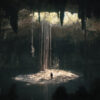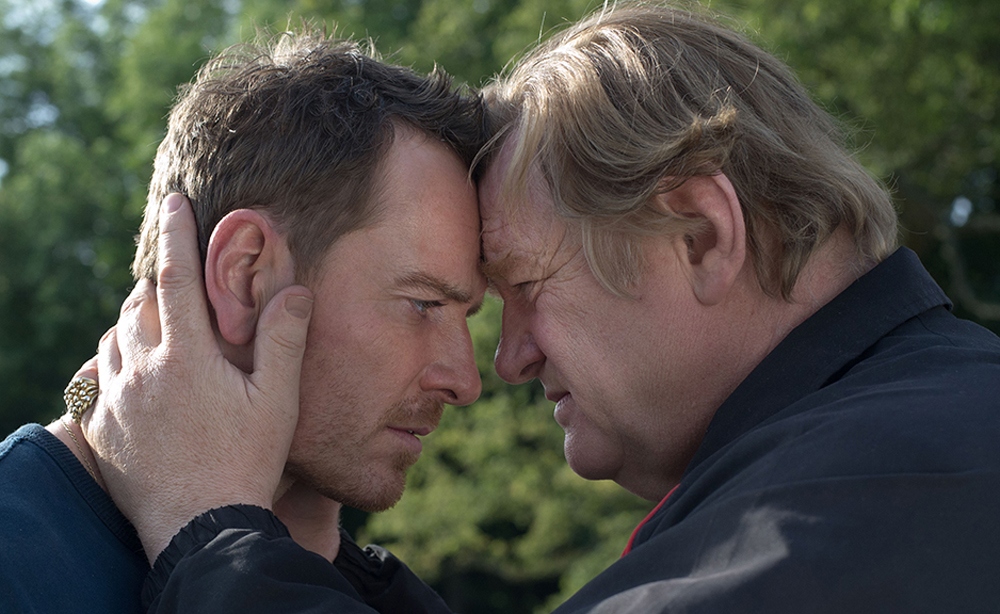Adam Smith is fond of reminiscing how he first met Georgie Smith, the young boy who plays the current end of the bloodline for the criminal Cutler clan in his directorial debut “Trespass Against Us.” In order to fit in amongst the family of bohemian thugs living on the outskirts of Gloucester, pulling off elaborate heists to keep up their lifestyle, the director had an unusual issue come up in casting the child – none of the boys could swear quite right, an indication that none had the rough-and-tumble spirit necessary to be part of the gang.
“We met with Georgie and I took the mickey out of Georgie and he kicked me in the shins, so I had this huge bruise and Alistair [Siddons, the screenwriter] starting laughing, so he kicked him in the shin,” Smith recalled during the BFI London premiere of the film. “We went home with these two purple marks on our legs and thought, ‘We found him!’”
As Smith and Siddons found the humor in being brutalized then, they surely find it in the ace “Trespass Against Us,” which tracks the exploits of the wild and wooly Cutlers in full flourish, clinging to the side of cars for the police chases they’re routinely caught up in and hanging onto every word of the possibly even more bracing verbal knockabouts that commence between the rambunctious family members. Still, for all the work that Smith did to put together the perfect family, bringing in Brendan Gleeson and Michael Fassbender on to play father and son Colby and Chad, the film unfolds as the latter wants to escape the life of crime, already upsetting his father by putting his son in school and slowly but surely sneaking away from his role as a getaway driver for a more quiet domestic life with his wife (Lyndsey Marshal). (Having to hide under a cow to evade the authorities, in one of the film’s most memorable moments, will have that effect.)
Though Chad has been waiting for quite some time to make this move, it pales in comparison with Smith’s ascension to the director’s chair for a feature, spending the last decade building up an evocative collection of music videos that feel like true collaborations with artists such as The Streets and The Chemical Brothers while showing off his range in helming such TV shows as “Doctor Who,” “Skins,” and the acclaimed “Little Dorrit” miniseries. He and Siddons bring great verve to “Trespass Against Us,” ably conveying a nasty streak a mile wide amongst cons while gradually revealing a surprisingly compassionate core, clearly in love with this family of hoodlums even when they might not love each other. Shortly before the film is released in the States, Smith spoke about capturing the countryside gangsters proper, tackling a first feature that involved everything most filmmakers want to avoid and working with the Chemical Brothers on a score, that like the film, takes something familiar and turns it towards an interesting new direction.

It was an amazing script that transports you into a world that I don’t think that many people have experienced, and it was funny, emotional, and exciting with the car chases, but most of all it just spoke to me on a personal level of connection I had with [Michael Fassbender’s character] Chad really – being brought up to be a certain thing and the challenges of trying to break away from that. It’s heartbreaking in the script, so I really was drawn to that. It felt fresh and different and I read a lot of scripts and “Trespass” really just jumped out.
I’ve heard this has actually been in the works for 12 years. Did it evolve much during that time?
It wasn’t full-time for 12 years, but it came about from Alistair and I working on a documentary about pirate radio, where you get illegal radio stations about 12 years ago. He carried on working with the documentary production company and was looking for new projects [when he] found this amazing real-life family, the Johnsons, who live in the Cotswolds. They were the most notorious criminal family in the area and he fearlessly got to know them and had these incredible interviews. He was showing me this stuff, trying to persuade me to direct the documentary and I was like, “This is brilliant,” and I really wanted to do it, but at that point, I had just started working with a guy called Mike Skinner [of the band] The Streets and I was able to make these short films that are masquerading as music videos. I was getting to work with actors and story, so I didn’t want to embark on another year of observational documentary making.
I loved these characters and I loved the stories, so I said, “You’ve got to write these down and make a film about this one day.” At that time, we just watched “Black Cat, White Cat,” Emir Kusturica’s film, which is about travelers in Eastern Europe, so [Alistair] went on and worked on that [documentary], someone else directed it and he carried on getting stories, remaining friends with the family. We tried to write [a narrative script] together, but that didn’t work and we tried to get other writers – that didn’t work. Eventually, Alistair went off and came back with this incredible script, which was inspired by this family, but he made it very personal and really honed in on the father and son relationship. It was incredibly moving and funny and different and challenging — you know, children, animals, car chases, night shoots, movie stars, lots of different financiers – all the fun of the fair. [laughs]
Your cinematographer Edu Grau, who’s been on some crazy shoots, has said this was one of the most difficult shoots he’s been on. Did all those factors create a perfect storm?
Yeah, everything contributed to it. The subject matter of the film sometimes spills into real life and you’re making a film about very macho, dysfunctional men and that created a certain environment – anti-authoritarian – but it all fed into the film. We had night shoots, but on the shortest nights of the year because we were shooting in the summer [so] there was never an uneventful day. A lot of strong personalities. It was a ride, just like the film. It was tough, but making films is tough.
Was doing a feature any different for you?
It was very different. I’d done big TV stuff [before], directing for the BBC, “Doctor Who,” where we introduced the new doctor, Matt Smith, and there was quite a lot of pressure there. So I was thinking, “Why is everyone saying it’s very different?” And I still don’t really know why it was, but it was. With television, I think you’ve got a broadcast day, so you know you’ve got an audience that are going to watch it and with film, you’re surrounded by a lot of people who have put a lot of money in or put a lot of other people’s money in [laughs] and there’s an element of fear that permeates that.
When I actually think of your work, as you mentioned with The Streets, where it’s an urban environment, or with the Chemical Brothers, where it’s sometimes futuristic, there’s always such a dynamic feel you get from where you shoot, but her you manage to do the same with the countryside. Was that an interesting experience?
The family story was the most important to me, but [I was] definitely trying to get this sense that this drama plays out in England’s green and pleasant pastures — this is the Cotswolds, where the prime ministers live and it’s one of the richest areas in England. Yet it also has some of the poorest inhabitants as well, so the idea of this family that lived in caravans in this quite anarchic way in this landscape was really interesting to me. I actually would’ve liked to have seen more of the country, and it’s hard to do. Wide shots in the country are much harder than wide city shots, to make them really say something and be beautiful. When it’s really well-done, you don’t even think twice. You just go, “Oh wow, that’s beautiful” when you see a film with lots of wides in the country, but trying to do it is actually quite tough.

Part of that was there’s a set of rules that I imposed, much to Edu’s frustration at times on how we shot the cars. There were certain shots that we’d use, and for that particular scene, you’ve hit on it exactly. I wanted to show what the divide was – in fact, there is a two-shot in that sequence – but [Chad’s] lying to his dad and his dad knows he’s lying, and his dad on some level is lying to him so if you’d shot it from inside the car and had the camera behind them, that would’ve felt too intimate. It needed to cinematically show that divide in them.
Knowing your relationship with the Chemical Brothers, did you actually start talking about the score before post-production?
Yeah, long before actually. When I first read the script, Ed [Simons] and Tom [Rowlands] sprang to mind – obviously, I’d known them a long time, but it was more the fact that the Chemical Brothers’ music has got an energy, an excitement, a chaos, an anarchy and a profoundly emotionally moving aspect – all those aspects exist in their music. It was perfect for this, so I sent Tom the script and he really loved it. After the meeting for the first read-through, he went back to the studio and was inspired to write a load of stuff — I don’t think any of it exists in that form in the final film, but it was brilliant.
We had to find was an instrumental palette that worked for the film that wasn’t necessarily archetypal Chemical Brothers palette, so it was quite a lot of pushing Tom to work outside his comfort zone, but he’d make stuff in the way he does with synthesizers in his home studio. Then he’d get musicians to record that stuff and he’d take that back into his studio and manipulate it and sharpen it and put it through effects to make something that had a timeless and emotional quality, but also had all the energy and the passion of the Chemical Brothers track.
Since it’s your first feature, what’s it been like to bring it out into the world?
When it plays in a theater, it’s wonderful. The last time I actually sat and watched it was at Toronto and there were 2000 people. They booed and laughed and clapped and obviously, it’s a film lovers’ crowd, but it was really moving to see an audience respond like that. Obviously, there’s been some people who didn’t get it and didn’t like it and that’s the way of the world, but I’ve done lots of [film festivals] – Zurich and Macau and China and London — and [when I do the] Q & As, people seem to really be moved by it and that’s all you can ask for really.
“Trespass Against Us” opens in limited release on January 20th, including Los Angeles at the Laemmle Music Hall and New York at Cinema Village, and is available on VOD.




